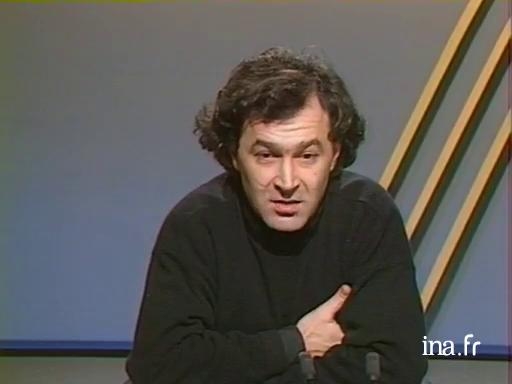Christian Rolland
Another idea for going out, cinema, in theatres or in a festival.
This weekend is the end of the Premiers Plans festival being held in Angers.
We spoke about it this week, with the jury president, Henri Alkan, who is the photography director.
It's a festival that maintains that it is entirely European, and it gives out "best" titles:
best short story, best film, best works.
We are now speaking with Peter Popzlatev, live but from the Nantes studio.
Hello.
Peter Popzlatev
Hello.
Christian Rolland
You are a Bulgarian filmmaker.
You are approximately thirty years old.
You're presenting your first feature-length film, "I, Countess", in Angers.
It's a film that takes us back twenty years,
when the shock of the revolt of ideas and values in 1968 reached our country, Bulgaria,
but at that time, the governing power,
well, they didn't like long hair, nor miniskirts, nor rock music, right?
Peter Popzlatev
Exactly.
Christian Rolland
So, if I'm not mistaken, you were around twelve years old in 1968.
Were you a victim of acts of censorship like that, in Bulgaria?
Peter Popzlatev
Well, yes, I did experience all of that.
Besides, in the beginning, I must tell you that it was a film that was inspired by a real story,
I mean, there is a genuine prototype that is experienced exactly the way that we're describing it in... with this film,
so of course, to sum things up, it's not a story...
I mean, it's a story that's a sort of peak for the youth,
for an entire generation that was between 15 and 18 years old in 1968.
So now, well, when I think about it, those were years that kind of affected us almost everywhere in the world.
You know, because it wasn't just in Paris in 1968 or in Czechoslovakia in 1968,
it was also a significant year, even for Bulgaria,
because there was already the international student festival
which nevertheless gave Bulgarians, young Bulgarians, the chance to meet with each other a bit...
to meet people from the West for the first time.
Christian Rolland
Tell me, Peter, and correct me if I'm wrong.
I get the impression, however, that despite everything, and I really mean despite everything, that it was hard for certain people,
resources were censored, there were people who were sent to prison,
that even in cinema, in most of the eastern countries,
you could still be slightly critical of these regimes before talking about freedom and all that.
Am I right or not?
Peter Popzlatev
You really have to understand things.
It wasn't really like that.
You could sometimes criticise, but I don't think you could criticise much,
which means that you couldn't bluntly tell the truth.
So, you either describe things as they are or you hide them.
So, my goal wasn't to criticise anything.
My objective, with this film, was just to show people how we lived.
And if there are some things that aren't pleasant for the government, such as what went on until 10 November of last year,
well, you're well aware that we now have a new government as of 10 November of last year,
so things might have been unpleasant,
but in the end, I'm still proud that I made a film, a real story,
and that I showed the situation as it was.
Christian Rolland
What do you think is going to happen during the next few years, especially for you?
It's Jivkov's government, Jivkow has left.
Are you going to go back to Bulgaria?
Are you going to stay in Bulgaria?
Do you think that now you'll be able to make the films you want without having any censorship or economic problems?
Peter Popzlatev
I hope that I don't have any problems, at least not with censorship.
As for economic problems... I'm returning to Bulgaria, of course,
because I already have a project on which I've been working on for 2 months.
Nevertheless, I hope that now there will be much fewer censorship problems,
especially since that was my main problem until now.
Well, I started out with a short film in 1982, a short documentary.
And then, in the years... between 1982 and 1987, I made 7 documentary films
I can testify that 4 of them have already been censored.
So, until now, my personal problem was censorship,
not so much economic problems, such as financing.
I think that the problem of financing is applicable to all directors,
for each one that's starting out in cinema.
Of course, there will probably also be financing problems as well,
but mainly, I hope to have freedom of expression, which is already quite nice.
Christian Rolland
Indeed, it's like an essential right.
We know that not everyone has it.
In any case, thank you, even for just these short minutes, for coming from Angers all the way to Nantes to give your testimony.
I understand that you're going to go back to Angers, where your film is entitled "I, Countess",
and from what Florence [Leterne], the press attaché, has told me on the phone,
I think that the audience was very, very pleased with it.
So, that's quite encouraging for you, Peter.
Have a safe return to Bulgaria.
Peter Popzlatev
Thank you.
Christian Rolland
And hope to see you again, just like that, with a second film
and hopefully without talking about censorship problems,
only talking about creation and cinema.
Peter Popzlatev
With pleasure, with pleasure,
because, in any case, I just want to say that I'm very impressed with the way the audience accepted this first film, in Angers.
It was really excellent.
Christian Rolland
Yes, I think it's a true morale-builder, a helping hand,
and Henri Alkan also mentioned it this week.
Thank you very much.
So this is taking place at the first Premiers Plans festival, in Angers.
Thank you, Peter, goodbye.



